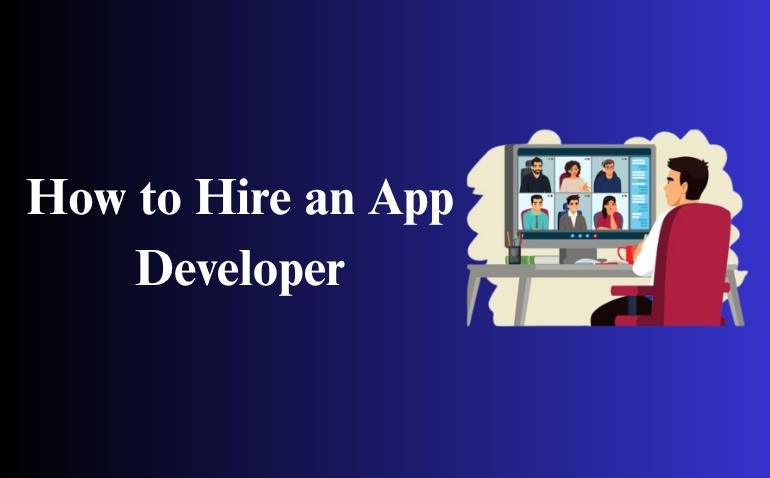Table of Contents
How to Hire an App Developer: A Complete Guide for Businesses in 2025
In 2025, mobile apps are not just digital tools — they are the heartbeat of most modern businesses. Whether it’s a small startup building a simple productivity app or a global enterprise designing a next-gen eCommerce experience, mobile apps have become the front door to customer interaction. The real challenge, however, begins when you have a great idea but don’t have the technical skills to bring it to life. That’s where hiring the right app developer comes in — someone who can take your concept, structure it technically, and turn it into a polished, functional, and scalable application.
Hiring an app developer might sound straightforward at first — after all, there are thousands of freelancers, agencies, and firms offering their services. But the truth is that finding the right developer — one who understands your vision, fits your budget, and delivers quality work on time — can be complicated. In this blog, we’ll walk through the entire journey of hiring an app developer, from the earliest planning stages to long-term collaboration.
Understanding What You Need Before You Hire
Before you even start looking for developers, the first step is to understand what you actually need. Too often, business owners rush into hiring without having a clear vision of their project. You must define the core purpose of your app. What problem does it solve? Who will use it? Is it for iOS, Android, or both? Do you want a native app, which is built specifically for one platform, or a cross-platform app, which runs on both using a single codebase?
For example, if you’re planning to launch an eCommerce startup, your app might need payment integration, product listing management, and user accounts. If you’re creating a healthcare app, you may need strict data privacy protocols and API integrations for wearables. Each use case demands different technical expertise. Defining these requirements clearly will help you find a developer who is skilled in the right technologies and frameworks.
It also helps to think about your timeline and budget early on. Are you developing a quick MVP to test your idea, or a full-fledged product? Setting these boundaries helps you avoid mismatched expectations later.
The Types of App Developers You Can Hire
Once you know what kind of app you want to build, you need to understand the types of developers available in the market. Broadly speaking, there are three main categories — native app developers, cross-platform developers, and backend developers.
Native developers specialize in building apps for a single operating system — iOS or Android. iOS developers typically use Swift or Objective-C, while Android developers work with Kotlin or Java. These apps generally offer better performance and a more seamless user experience but can be more expensive because you’ll need two separate teams if you want both iOS and Android versions.
Cross-platform developers, on the other hand, use frameworks like Flutter, React Native, or Xamarin to write code that works across multiple platforms. This approach is cost-effective and faster for projects that don’t require highly complex or platform-specific features.
Then there are backend developers, who handle the server-side logic, databases, APIs, and integrations that power your app behind the scenes. A front-end app without a solid backend is like a beautiful car without an engine. Backend developers often use technologies like Node.js, Python, PHP, or Ruby on Rails.
In many cases, especially for startups, hiring a full-stack developer who can handle both the frontend (the visible part of the app) and backend (the server-side logic) is a smart move for early development.
Freelancers, Agencies, or In-House Developers?
One of the biggest decisions you’ll face is choosing how to hire — whether to go for freelancers, app development agencies, or build your own in-house team. Each option has its own pros and cons.
If you’re a startup working on a tight budget, freelancers can be an excellent choice. They are flexible, cost-effective, and often very skilled in niche technologies. Platforms like Upwork, Toptal, and Fiverr make it easy to find and evaluate freelance developers from around the world. The main challenge with freelancers is consistency and commitment. Since they often juggle multiple projects, deadlines can be unpredictable, and project management becomes crucial.
Agencies, on the other hand, provide you with an entire team — project managers, designers, developers, and testers — all working together. This is great if you want to hand over the project and focus on business strategy. The downside is cost; agencies are usually more expensive. However, they also tend to offer reliability, structured communication, and post-launch support.
Finally, if you’re planning a long-term project or building a product that will evolve over time, creating an in-house development team can be the best investment. You get complete control over development, immediate communication, and the ability to shape your product continuously. The tradeoff is the expense of hiring, onboarding, and retaining employees, along with the overhead of salaries, tools, and management.
Where to Find App Developers
Finding a great developer in today’s digital world is easier than ever — if you know where to look. Platforms like Upwork and Freelancer let you browse thousands of developers, check portfolios, read client reviews, and even conduct interviews directly. Toptal is another excellent option for premium developers; it claims to accept only the top 3% of applicants, ensuring high-quality talent.
LinkedIn has become a surprisingly powerful tool for recruitment as well. By searching for keywords like “mobile app developer,” “Flutter developer,” or “React Native engineer,” you can connect with experienced professionals directly.
For companies seeking full-fledged teams, websites like Clutch.co provide verified lists of top app development agencies, categorized by location, budget, and expertise. GitHub and Stack Overflow are also hidden gems — they allow you to see developers’ actual work, coding style, and contributions to open-source projects.
When shortlisting candidates, focus on developers who have worked on projects similar to yours. For example, if you’re developing a travel booking app, find someone who has experience integrating maps, payment systems, and user logins.
What Skills Should You Look For?
Hiring an app developer isn’t just about coding languages. The best developers combine technical skill with problem-solving, creativity, and communication. From a technical perspective, they should be fluent in the languages relevant to your app — Swift or Kotlin for native apps, Dart for Flutter, JavaScript for React Native, and so on. They should understand mobile UI/UX principles, API integration, cloud services (like AWS or Firebase), and have a good grasp of testing and debugging.
But soft skills are equally important. A developer who can explain their work clearly, respond promptly, and collaborate with designers or business stakeholders will make the entire process smoother. The ability to adapt to feedback, work in agile sprints, and manage version control using Git are also key qualities.
The Hiring Process in Depth
Once you’ve shortlisted a few potential developers, the real evaluation begins. Start by reviewing their portfolios carefully. Look for diversity — have they built different kinds of apps? Are their previous apps live on app stores? If possible, download and test some of them. A developer’s past work is the best predictor of their future performance.
After portfolio review, conduct a technical interview. This doesn’t have to be overly complex, but it should test how they think through problems. Instead of just asking coding trivia, discuss real scenarios. For example: “If an app starts lagging after adding a new feature, how would you identify and fix the cause?” Their answer will show whether they think like a problem-solver or just a coder.
Communication testing is vital. Discuss time zones, preferred communication tools, and update frequency. You want someone who responds promptly, explains things clearly, and sets realistic expectations.
Before making a final commitment, it’s smart to assign a small paid test project. This could be something like building a basic login screen or a simple API integration. It’s the best way to gauge their quality and reliability before entering a long-term contract.
Once you’re satisfied, formalize the agreement. Always use a written contract that outlines deliverables, deadlines, payment milestones, and intellectual property rights. If your app involves sensitive information, sign a Non-Disclosure Agreement (NDA) as well.
How Much Does It Cost to Hire an App Developer?
App development costs vary widely depending on the developer’s location, experience, and the complexity of your app. Developers in the United States or Western Europe typically charge between $60 to $150 per hour, while equally skilled developers from India, Southeast Asia, or Eastern Europe may charge $20 to $50 per hour.
A simple MVP (minimum viable product) app may cost between $5,000 and $15,000. A medium-complexity app, such as a social media or eCommerce platform, can range between $20,000 and $40,000. Large-scale enterprise apps with custom backend integrations, analytics, and complex UI can easily exceed $100,000.
While cost is an important factor, don’t hire solely based on the cheapest quote. Often, the cheapest developer ends up being the most expensive one in the long run if the code needs to be rewritten or if bugs keep surfacing. Aim for the best balance of skill, reliability, and communication within your budget.
Avoiding Common Hiring Mistakes
One of the most common mistakes businesses make is hiring too quickly. In the rush to meet deadlines, many skip due diligence, leading to poor quality work and wasted money. Another mistake is failing to communicate the project clearly. Ambiguity in expectations almost always leads to friction later.
Many also underestimate the importance of testing. Even the best developers can miss bugs. Always include proper quality assurance in your hiring plan, whether it’s handled by the developer or a separate QA team.
Time zone differences can also cause frustration if not managed well. If you’re hiring internationally, set a clear schedule for updates and feedback calls. And lastly, never skip a contract — verbal agreements are risky, no matter how trustworthy the developer seems.
Managing and Retaining Your Developer
Once you’ve found a great developer, keeping them engaged is just as important as hiring them. Start by creating a structured workflow using tools like Trello, Jira, or Asana. Define weekly goals and hold short check-ins to review progress.
Encourage open communication — developers should feel comfortable sharing challenges or suggesting improvements. Recognize good work with bonuses or future opportunities. The more valued they feel, the better they’ll perform.
In 2025, the best developers have many options. Retention often depends not just on money but on mutual respect, flexibility, and learning opportunities. If you treat your developer as a long-term partner rather than just a service provider, they’ll go the extra mile for your project.
Final Thoughts
Hiring an app developer is both an art and a strategy. It’s about finding someone whose skills align with your vision and whose mindset complements your goals. The process may take time — from defining your app’s purpose to screening portfolios, testing communication, and finalizing contracts — but the effort pays off when your idea transforms into a beautifully crafted, fully functional app that users love.
In 2025 and beyond, the competition for user attention will only get tougher. Having a reliable, skilled, and forward-thinking app developer by your side can make all the difference between an app that gets deleted after one use and an app that becomes a daily essential in people’s lives.
So, take your time, do your research, and hire not just a developer, but a creative partner who believes in your idea as much as you do. Because great apps aren’t built by code alone — they’re built by collaboration, clarity, and a shared vision for something extraordinary.


